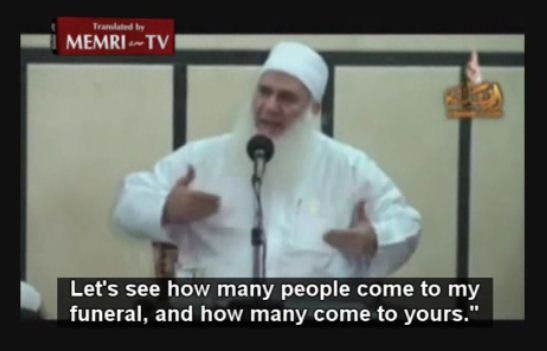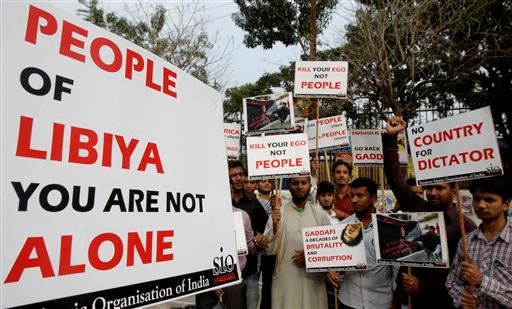The following is research published today from MEMRI’s Special Dispatch Series and the MEMRI TV Project.
Special Dispatches No. 3713—Egypt
Egyptian Cleric Muhammad Hussein Yaaqub: Results of Egyptian Referendum were in Favor of Islam, and Whoever is Unhappy about It is Free to Leave to Canada or the U.S.
Following are excerpts from a speech delivered by Egyptian cleric Muhammad Hussein Yaaqub, which was posted on the Internet (accessed on March 21, 2011). Yaaqub is an Egyptian cleric, born in 1956 in the Matmidiyah area of Imbaba, in the Giza Governorate. He was one of the founders of The Matmdiyah Islamic Association for Muslims that aims to "unite the efforts [among Muslims] to act according to the Qur'an." Sheikh Yaaqub received his Islamic education in Saudi Arabia, and according to his website, he has traveled to many European and Western countries, including the U.S.
To view this clip on MEMRI TV, visit http://www.memritv.org/clip/en/0/0/0/0/0/0/2874.htm.

Muhaamad Hussein Yaaqub: "Dear brothers, I have received the good tidings that the result is 'Yes' [in the constitutional referendum]. Allah Akbar."
Crowds: "Allah Akbar."
Muhaamad Hussein Yaaqub: "This was an [Islamic] raid – the raid of the ballot boxes. Our forefathers used to say to the heretics: 'The difference between us will be evident in our funerals. Let's see how many people come to my funeral, and how many come to yours.' In our days, people say: The difference between us is evident in the ballot boxes.
"Indeed, we have made the difference between them and us evident in the ballot boxes, and the ballot boxes said 'yes' to 'Islam...'"
To read the full report, visit http://www.memri.org/report/en/0/0/0/0/0/0/5145.htm.
Special Dispatches No. 3711—Egypt/Women's Topics
Article on Muslim Brotherhood Website Advocates Transportation for Women Only
In an article on the official website of the Muslim Brotherhood, Iman Isma'il called for establishing separate transportation for women in Egypt. Isma'il said she planned to propose her initiative to bus drivers, and then bring it before the Egyptian government as an official campaign.
Following are excerpts from her article:
"'Vehicles of all kinds, of a special and distinct color, with a sign that says "For Women Only," in which no man will touch us. We will not [have to] shout ourselves hoarse trying to get them to clear the way so that we can board or alight. We will not [have to] fight with anyone refusing to clear the way. Reasonably priced [transportation ensuring us] complete respect.'
"The above is not an imaginary scenario or the dream of someone who has lost her mind, but the hope of many of the girls in Egypt, who suffer more and more [when using public] transportation in the country. The realization [of these hopes] has become something simple and attainable since the January 25 Revolution."
For more from MEMRI on the Muslim Brotherhood, visit http://www.memri.org/subject/en/193.htm.
To read the full report, visit http://www.memri.org/report/en/0/0/0/0/0/0/5143.htm.
Special Dispatch No. 3712—South Asia Studies Project/India/Middle East
Indian Commentators on Middle Eastern Uprisings: 'Iran Loves the Thought of a Completely Shi'a Gulf'; 'The Current Situation in the Arab World Might Prove a Background for Change [Worldwide]'

In India's Hyderabad city, members of the Students Organization of India, the student wing of Jamaat-e-Islami Hind, express support for Libyan protesters on February 26, 2011
In recent columns in Indian newspapers, columnists have given a mixed verdict on the popular uprisings in the Middle Eastern countries, noting that while these revolts may result in some changes, they might not translate into a shift towards democracy. In a column titled "Gulf: Rising Shi'as, Uneasy Sunnis," renowned Indian columnist and author Swaminathan S. Anklesaria Aiyar observed that the "popular revolts in the Gulf nations may or may not evolve into democracy, but will certainly evolve into Shi'a-cracy."
Aiyar noted: "Some analysts hope for a peaceful transition from autocracy to democracy in the Middle East. Muslim autocrats have sometimes evolved into leaders of political parties in democracies. Two examples are Gen. Zia-ur Rahman in Bangladesh and Gen. Pervez Musharraf in Pakistan. It is just possible that some such transition could occur in North Africa too. But this will be impossible in the Gulf, since any political party formed by the Sunni rulers will be thrashed by Shi'a rivals."
In a column in the Urdu-language Indian daily Roznama Inquilab, Asim Jalal argued that the uprisings in the Middle East may herald a change in policy-making in favor of the poor. In an article titled "The Situation in the Arab World May Herald a Change In the World Scenario," Jalal wrote that the uprisings in the Middle East emerged because of poverty and increasing prices, and that there is a lesson in it for all other countries, including India, to frame their policies so as to meet the needs of the poor.
Jalal noted: "It is better for the rulers of other countries to bring reform, keeping in view public welfare, instead of remaining mute spectators to what is happening in the Arab world." He added: "In this way, these protests will not necessarily remain confined to the Arab world alone. They might affect the people of other Asian, African and European countries also."
To read the full report, visit http://www.memri.org/report/en/0/0/0/0/0/0/5144.htm.





















